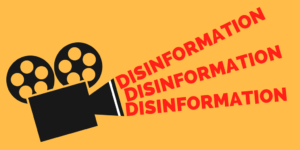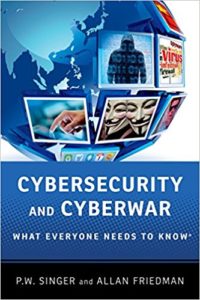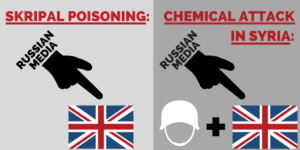
EU Stratcom Task Force
In the face of authoritarian foreign influence* operations, the U.S. Congress should support public-private partnerships to tackle the challenge posed by disinformation and abuse of social media platforms, according to Jamie Fly and Laura Rosenberger, the co-directors of the Alliance for Securing Democracy.
 Congress should create a fund with pooled public and private resources that would establish media literacy education and training pilot projects, helping to build resilience against foreign or other malign manipulation of our open society, they write for the Hill. In addition, Congress should:
Congress should create a fund with pooled public and private resources that would establish media literacy education and training pilot projects, helping to build resilience against foreign or other malign manipulation of our open society, they write for the Hill. In addition, Congress should:
- improve election security and cybersecurity. Many state elections boards lack the funding and expertise to adequately secure their elections systems against foreign intrusion. …
- improve disclosure requirements for online political advertisements. Americans should have the right to know who is funding political ads they see online, just as they do for political ads on radio, print and television. ….
- tackle illicit foreign money in our political system. Dirty money should be prevented from entering the country. …RTWT
But Europe, not Congress, is more likely to address the threat posed to democracy by social media and disinformation, the Washington Post’s Michael Birnbaum & Tony Romm contend.
 Technological advances have played an obvious and fundamental role in new forms of hybrid attacks against the West, according to Northwestern University analysts Buddhika Jayamaha and Jahara “Franky” Matisek. The rise of “troll farms” contribute to hyper-polarized debates, leading many citizens with access to social media to subconsciously choose one side of a false-choice debate without realizing there could be a moderate choice and policy, they write for the AWC’s ‘War Room’:
Technological advances have played an obvious and fundamental role in new forms of hybrid attacks against the West, according to Northwestern University analysts Buddhika Jayamaha and Jahara “Franky” Matisek. The rise of “troll farms” contribute to hyper-polarized debates, leading many citizens with access to social media to subconsciously choose one side of a false-choice debate without realizing there could be a moderate choice and policy, they write for the AWC’s ‘War Room’:
It is also more than just a “weaponized narrative,” because propaganda-like efforts are no longer meant to shape the information terrain in favor of the aggressor. Instead, hybrid attacks on civil society are meant to weaken the system from within, by weaponizing grievances and social divisions, and even highlighting hallmarks of a liberal democracy (i.e. pluralist interest representation) as vulnerabilities. This is accomplished with an intent on making existing problems appear intractable and creating imaginary problems that fragment and polarize as many group identities as possible.
 Much less promiscuous are the means of adversarial states using “sharp power” to silence critics as a way of shifting focus and commentary away from their own corrupt governments and authoritarian societies, they add. RTWT
Much less promiscuous are the means of adversarial states using “sharp power” to silence critics as a way of shifting focus and commentary away from their own corrupt governments and authoritarian societies, they add. RTWT
The US and UK are accusing Russia of launching what they’re calling “malicious” cyberactivity, targeting government institutions, infrastructure and internet providers, and warning of growing disinformation and trolling in the wake of the Syrian chemical attack.
Russia’s trolls and propagandists have turned Soviet disinformation into a terrifying art form, argues Bob Seely, a British MP and expert on Russian information warfare . Information warfare is more important than ever – and Russia is beating the West hands down, he writes for the Daily Telegraph.

EU Stratcom Task Force
Beyond retroactively deleting fake news pages and accounts, what more can be done to prevent the spread of disinformation? Alexander Babuta, RUSI Research Fellow IN National Security and Resilience, asks.
“It seems that automated content removal is the only viable preventive action social media companies could take to ensure that disinformation does not appear on their platforms in the first place,” he writes. “However, tech companies’ experiences with extremist content-removal demonstrate the difficulties in developing systems to automate content takedown, for this technology inevitably results in large amounts of legitimate content also being blocked.”
*China’s overseas influence efforts come under the spotlight in the latest issue of the National Endowment for Democracy’s Journal of Democracy in articles by John Fitzgerald on Australia, Anne-Marie Brady on New Zealand, Donald K. Emmerson on Singapore, and Martin Hala on Central and Eastern Europe.







